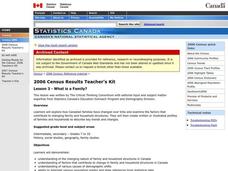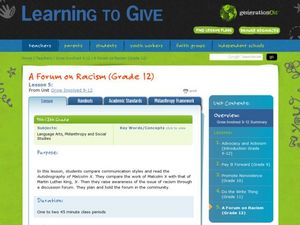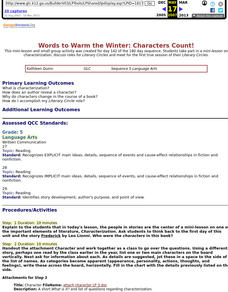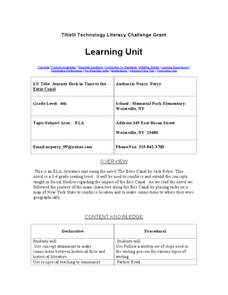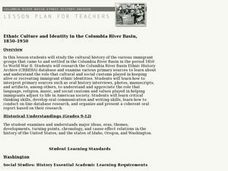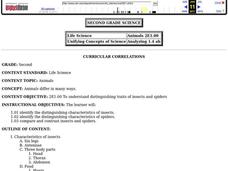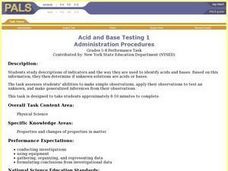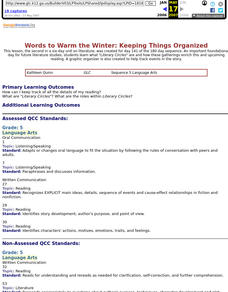Curated OER
Activism and Social Reform in America from 1800-1850
Learners discuss idea of social status, examine antebellum social reform movements, and compare and contrast experiences of activists who sought to improve workers' lives, end slavery, reform immigration laws, and establish voting rights...
Curated OER
Can't You Make Them Behave, King George?
Fifth graders describe the changes in King George III's policy toward the American colonies by sequencing key events between the French and Indian War and the American Revolution. They explain the colonial reactions to command decisions...
Curated OER
What price Freedom! Civil War and Reconstruction
Fifth graders become familiar with the events of Reconstruction and the 13th, 14th, and 15th amendments. In this reconstruction lesson plan, 5th graders work in pairs where each student creates a building with blocks and draws it. Their...
Curated OER
What is a Family?
Students explore how Canadian families have evolved over time. In this census results lesson, students examine the factors that contribute to changing family and household structures. Students also create written and illustrated profiles...
Curated OER
Breaking News English: Happy Marriages
In this happy marriages instructional activity, students read the article, answer true and false questions, complete synonym matching, complete phrase matching, complete a gap fill, answer short answer questions, answer discussion...
Curated OER
A Forum on Racism
Twelfth graders compare and contrast the work of Malcolm X and Martin Luther King, Jr. In this racism lesson, 12th graders read The Autobiography of Malcolm X and discuss how Malcolm X and Martin Luther King, Jr. approached ending racism.
Curated OER
Words to Warm the Winter: Characters Count!
Fifth graders take part in a mini-lesson on characterization, discuss roles for Literary Circles and meet for the first true session of their Literary Circles.
Curated OER
Immigration and Settlement of Ethnic Groups in the Pacific Northwest
Young scholars examine ethnic history of the Pacific Northwest in the period 1850-1950. They research documents and images in digital archives to explore immigration of various ethnic groups that settled in the region during this period.
Curated OER
African Americans in the Columbia River Basin
Students research the Columbia River Basin Ethnic History Archive (CRBEHA) and use a variety of primary sources to explore the history of blacks in the region.
Curated OER
Mississippi Delta Blues Moves: Second in a Series of Three with Barb Hoffman and Steve Hoskins, MGM
Learners complete a graphic organizer reviewing Barb Hoffman's prior lesson plan," Slave Songs (1840-1876)" as well as listen to and discuss Delta Blues music samples. Students research one Delta Blues singer and write a "color coded"...
Curated OER
Indoor Air: What's the Matter?
Students develop a greater awareness of the variety and amount of particulate matter in the air. They try to locate general sources of pollution for a specific area and develop some suggestions for improving air quality.
Curated OER
Erie Canal: Journey Back in Time
Fourth graders read the novel, The Eric Canal, identifying the characters and setting. They respond to daily reading by writing in journals and complete a short answer test upon completion of the novel.
Curated OER
Chinese Newspapers
Students investigate the role of Chinese newspapers in the Australian Chinese community, both in the early 20th century and today. They identify the role of ethnic newspapers.
Curated OER
Ethnic Culture and Identity in the Columbia River Basin, 1850-1950
Students explore cultural history of immigrant groups that settled in the Columbia River Basin from 1850 to World War II, and examine various primary sources to explore role cultural and social customs played in keeping alive immigrant...
Curated OER
Ports in a Storm: A Surge of Solutions
Pupils examine various environmental health issues related to ports and the
shipping industry. As a class, they generate a systems model related to the ship-
salvaging industry. Then in small groups, they create their own systems model...
Curated OER
True Settlers of the Pacific Northwest: Who was there with Dr. John Mcloughlin?
Students discover who was present when the city of Vancouver was founded. Using the internet, they research the various cultures of the area and which were present at the Hudson Bay Company. They discuss each person's role in how the...
Curated OER
Animals
Second graders explore the ways in which animals differ. They discuss the characteristics of insects and spiders. Students identify the characteristics of insects and spiders. They compare and contrast insects and spiders.
Curated OER
Acid and Base Testing
Students study descriptions of indicators and the way they are used to identify acids and bases. They use this information to determine if unknown solutions are acids or bases.
Curated OER
Acid and Bases - Alien II
Eighth graders determine which of two solutions is more acidic by adding each to a given base. Students have to apply this analysis process to a problem scenario involving an alien creature.
Curated OER
Acid Precipitation
Young scholars test the acidity of unknown solutions. They use this information to make inferences from data given from recorded rainfall records to identify areas that receive the most acid rain.
Curated OER
Scientific Investigation- Magnets
Students conduct a scientific investigation to determine if a magnet attracts paper clips through different materials. Students write out their procedures, collect data and present it in a table or chart, and analyze their results.
Curated OER
Classification
Students work in groups of 4-6 for the experiment/activity part of this exercise. They classify ten animals using the information on the picture to group the animals. Students develop descriptions, explanations, predictions, and models...
Curated OER
Words to Warm the Winter: Keeping Things Organized
Fifth graders are in Literary Circles according to the book they've chosen and choose roles.
Curated OER
What's In A Name? How Did Surnames Come to Be?
Learners examine how in the early years of the Middle Ages, most people in Europe lived in small farming villages. Everyone knew his neighbors, and there was little need for last names.





